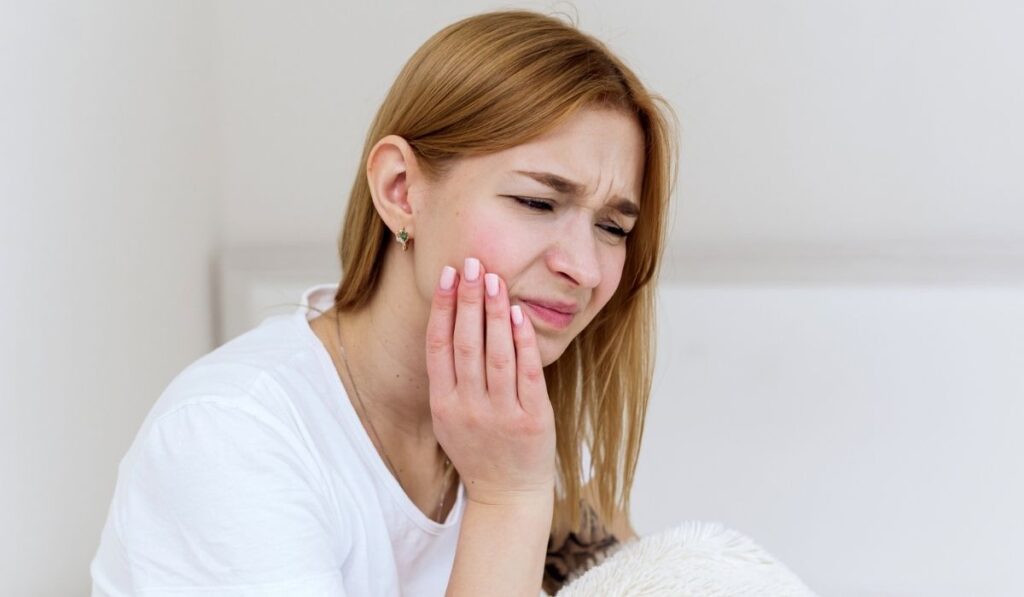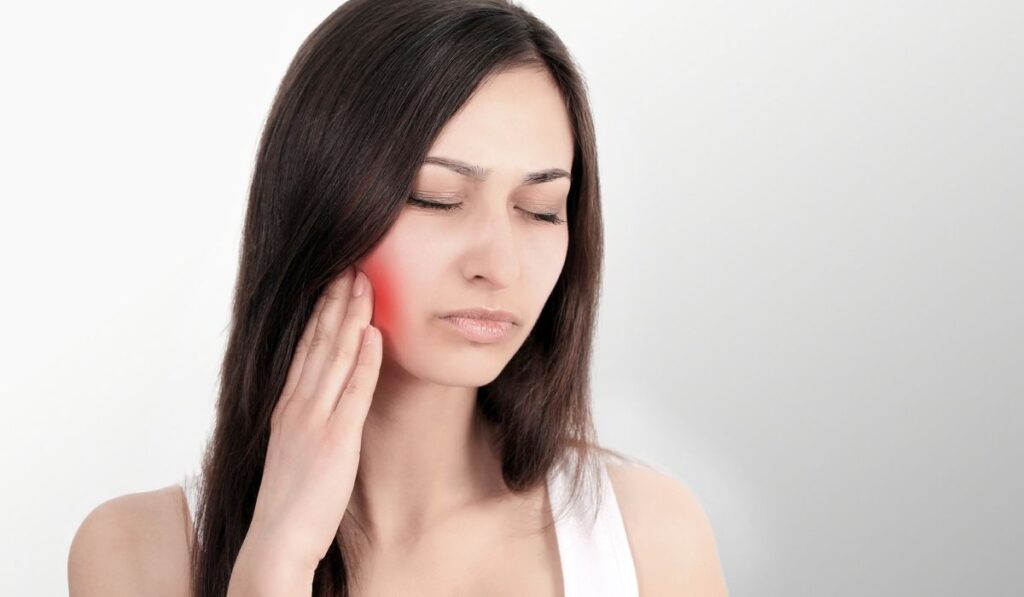Toothaches and pain can disrupt your life in a variety of ways. However, it sometimes seems like painful symptoms get even worse right before bed. This can negatively impact your sleep and performance the following day. What’s behind this problem?
Toothaches can flare up at night due to increased blood flow to the head. Issues such as tooth decay, unconscious grinding, and emerging wisdom teeth can also be contributing factors. Be sure to contact your dentist as soon as possible if you’re experiencing tooth pain at night.
Although a toothache may seem like a minor inconvenience, it’s important to treat one right away. Your symptoms can develop into more severe health complications if you don’t act fast. Here are some possible reasons your teeth hurt at night and what you can do about them.
Why Do My Teeth Hurt at Night?

Toothaches are frustrating at any time of day. However, pain and discomfort can be more serious during the night or when you’re trying to rest. It may even seem like your teeth are out to get you. Here are a few explanations as to why your teeth hurt during the evening.
More Blood Flow
If your teeth tend to flare up at night and start hurting, you’re not alone. Dental discomfort is typically amplified when you’re in a horizontal position, since you have increased blood flow to your head in that position.
This causes your pain and discomfort to intensify. However, lying down won’t cause pain if you don’t have any dental issues to begin with.
Cavities and Tooth Decay
Cavities, cracks, and tooth decay are some of the primary culprits behind tooth pain and discomfort. Carbohydrates and sugary foods interact with the bacteria in your mouth, creating acid in the process.
The acid creates plaque, tartar, and buildup, causing enamel erosion and sensitivity. Bacteria can start to seep into the inner layer of your teeth if the crack or decay is deep enough. This can cause infections or pain when lying down.
Unconscious Grinding or Jaw Clenching
Poor dental habits such as teeth grinding and jaw clenching can also cause pain in the evenings. Grinding your teeth unconsciously throughout the day or while you sleep can wear away at your enamel and teeth, causing cracks in the process.
If you clench your jaw when you’re stressed, you may experience dull toothaches or even headaches at night.
Gum Inflammation
Gum inflammation and recessions don’t always cause tooth pain when lying down. However, these issues can cause sensitivity and discomfort. Gum inflammation and recessions cause the sensitive roots of your teeth to become more exposed. You may experience a dull throbbing pain during the evenings.
Late-Night Snacking
Late-night snacking on carbohydrates or sugary foods can also cause toothaches. Sugar starts to interact with the bacteria in your mouth, producing acid. The acid begins to erode your enamel, eventually leading to cavities and decay.
The food debris can also get stuck between your teeth and gums, causing irritation and discomfort.
Emerging Wisdom Teeth
Emerging wisdom teeth are a common reason for toothaches and pain at bedtime. Your wisdom teeth are the last set of teeth to develop and can come in at any age.
They typically grow in inconvenient positions, resulting in shifting teeth and pressure. These factors cause dull, throbbing, or even intense pain.
You Keep Thinking About It!
Tooth pain can be easier to ignore during the day when you’re running errands, working, or engaged in some other activity. When you lie down for bed, you may simply be more aware of your toothache because you’ve got fewer distractions.
These factors can cause you to believe the pain is worse than it really is.
How to Get Rid of a Toothache at Night
Toothaches and pain can be challenging to deal with. These symptoms can flare up at night and negatively impact your life. Thankfully, there are some ways you can alleviate symptoms and manage your pain.
Take Over-the-Counter Pain Medication
You can take over-the-counter painkillers an hour before bed to alleviate painful symptoms. Pain medications like Ibuprofen, Motrin, or Advil (on Amazon) can help reduce inflammation, pain, and discomfort.
Be sure to speak with your dentist or primary care physician before taking one of these medications, and always follow all the dosing guidelines and instructions provided.
Use an Ice Pack
You can also use a cold compress or ice pack to alleviate the discomfort. Cold compresses and ice packs constrict the blood vessels of the affected location, reducing pain and swelling in the process.
You can apply a cold compress or an ice pack to the affected area of your jaw every few hours to ease your symptoms. Hold the ice pack or compress to the site for 15-20 minutes at a time.
Use a Bite Guard and Prevent Stress
You can use a mouth guard if you unconsciously grind your teeth during the night. You may have to speak with your dental hygienist to determine the correct treatment.
If you’re experiencing pain from clenching your jaw, you can practice relaxation techniques that might help.
Use a Topical Numbing Agent
You can relieve short-term pain with oral numbing agents like Orajel (on Amazon) and Anbesol (also on Amazon). These over-the-counter topicals contain the local anesthetic Benzocaine as their primary ingredient. Benzocaine numbs the affected area and blocks pain signals from the nerves.
Be sure to speak with your dental professional or primary doctor before using these ointments. Apply them as instructed, following all medical directions and guidelines.
Stop using Benzocaine and call your doctor as soon as possible if you experience a sore throat, fever, or other health complications. These products aren’t suitable for young children.
Use Elevation
As mentioned earlier, you have increased blood flow to your head when you lie down for bed. This can result in increased inflammation, pain, and discomfort. You can elevate your head by using extra pillows to help alleviate these symptoms.
Use a Saltwater Rinse
Saltwater rinses are a common remedy for minor toothaches and pain. Saltwater rinses can alleviate pain, swelling, and bacteria. Saltwater can also help remove excess food debris stuck between your gums or teeth. Furthermore, saltwater is a natural antibacterial agent.
Stir half a teaspoon of salt into a glass of warm water to make a saltwater rinse. Swish the solution in your mouth for up to 30 seconds. Be sure not to swallow it.
Use a Hydrogen Peroxide Rinse
Hydrogen peroxide solutions can help reduce plaque buildup and symptoms of gum disease. Symptoms of gum disease can include soreness, bleeding gums, and inflammation.
Use a 3% solution to make a hydrogen peroxide mouth rinse. Dilute the peroxide with equal parts warm water and rinse thoroughly. Do not swallow this solution. You can also try a hydrogen peroxide mouthwash like Colgate Peroxyl (on Amazon).
How to Prevent Your Teeth Aching at Night

The best way to prevent your teeth from hurting during the night is by practicing good oral hygiene techniques. Ensure you’re brushing and flossing your teeth on a consistent basis to keep them clean, prevent bad breath, and ward off decay.
Summary
Toothaches and pain can flare up at night for various reasons. One of the main culprits is increased blood flow to your head. Cavities, gum inflammation, and unconscious teeth grinding are also common causes.
Home remedies can ward off some symptoms, but they don’t treat the root of the issue. Be sure to contact your dentist and schedule a checkup as soon as possible if you’re experiencing a lot of tooth pain at night.


